Ample offers great-tasting, nutritious and high-quality meal replacement powders that take less than a minute to prepare and provide optimal nutrition for those days when you don’t have time to prepare a meal from scratch.
I’ve consumed over a hundred bottles of the various Ample formulas since May 2017, and I love to use Ample when I travel or don’t have time for a proper meal.
In this review, I’ll explain why I consider Ample to be one of the best meal replacement shakes on the market, as well as why the brand is such a great fit for a variety of dietary lifestyles.
If you’ve used Ample meal replacement shakes in the past, note that the company recently made significant changes to its product lineup. I’ll cover these changes in more detail below.
For now, you should know that Ample discontinued its Ample O (original), Ample K (keto) and Ample V (vegan) formulas, and replaced them with Ample (a low-carb formula) and Ample Restore (a high-carb formula).
Pros
- Delicious taste and texture.
- Available pre-bottled or in a bulk canister.
- Easy to get through airport security.
- Available in low-carb and high-carb formulas.
- Offers plant-based (vegan) options.
- High-quality ingredients.
Cons
- Expensive.
- Contains high-oleic sunflower and macadamia nut oil.
- Uses plastic containers.
To learn more about how Ample compares to other meal replacement drinks, check out these articles:
Ample Meal Shakes: A Brief History
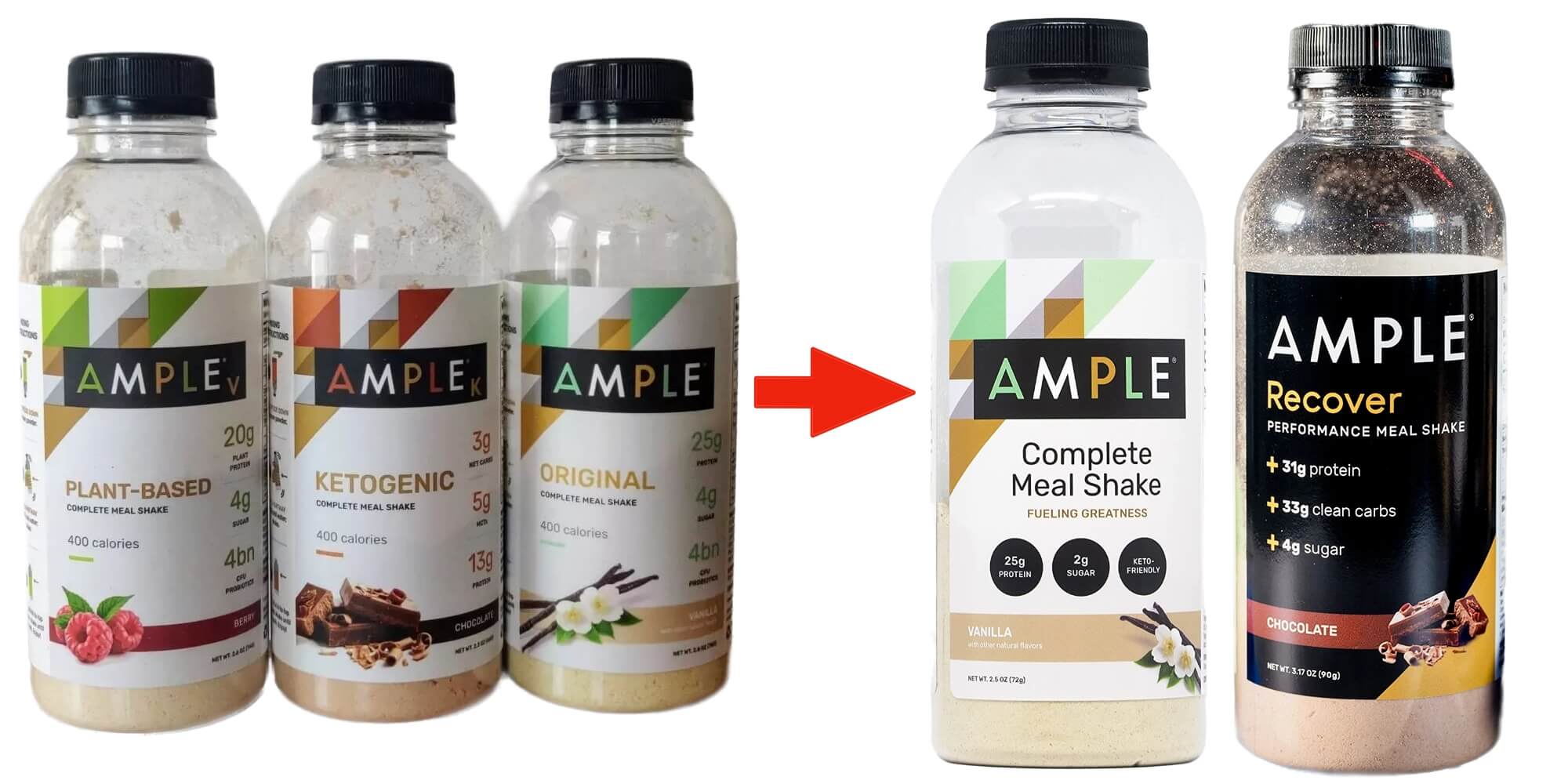
Back in 2015, Connor Young founded Ample Foods with the goal of creating a convenient and super-healthy drinkable meal that would take less than a minute to prepare.
The first product Ample Foods launched was Ample Original (Ample O), followed by a vegan-friendly version (Ample V), and then Ample K (a low-carb ketogenic formula).
Recently, Ample restructured and simplified its entire product lineup, combining Ample O, Ample K and Ample V into a single meal replacement powder. The result — simply called Ample — is a complete meal shake that’s low in carbohydrates and ideal for anyone who follows a low-carb or keto diet.
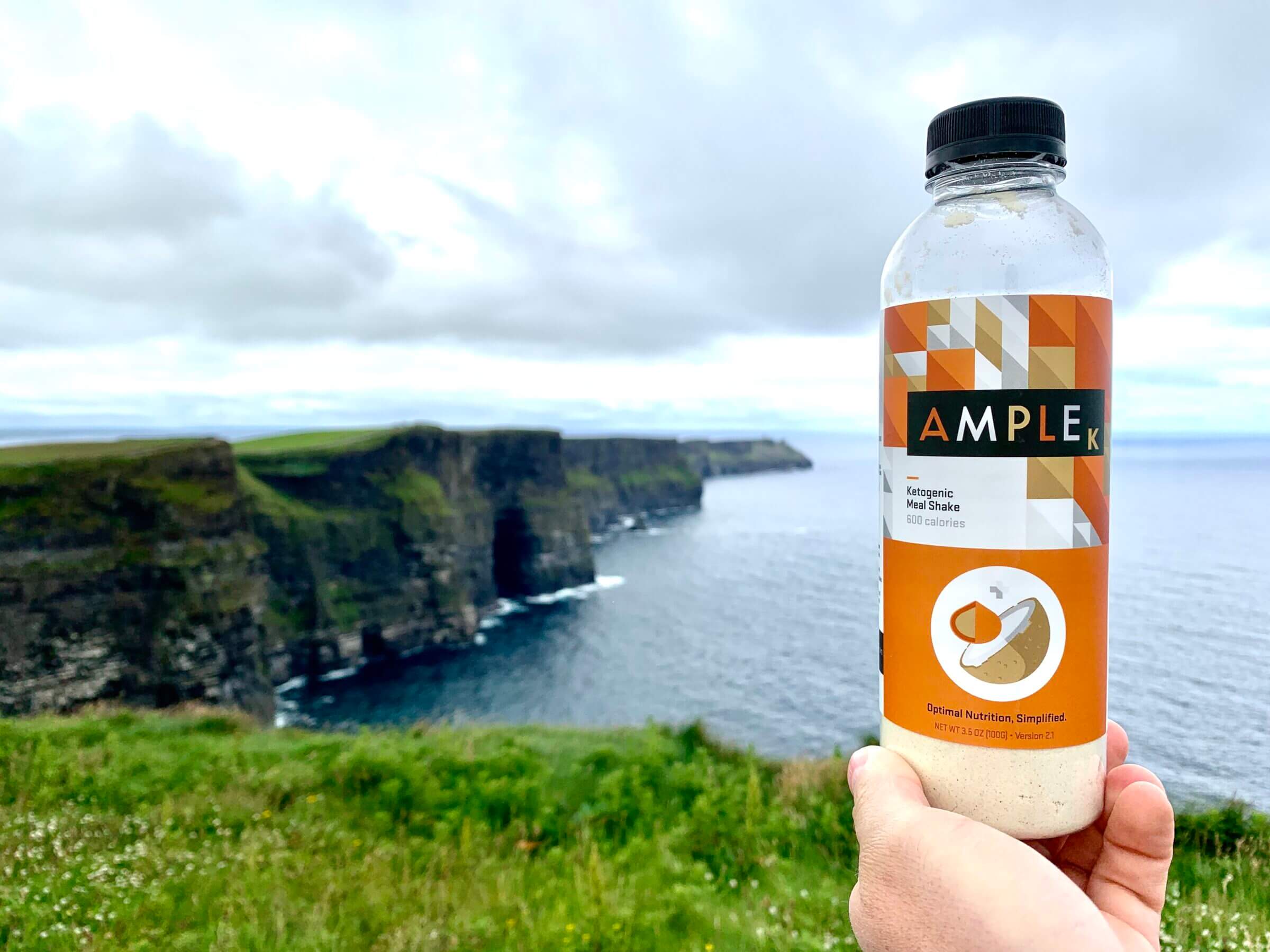
The new Ample meal replacement shake is available in three flavors, including chocolate, vanilla and berry.
Berry uses only real-food ingredients that are suitable for vegan dieters. In the past, Ample’s vegan formula (Ample V) was high in carbohydrates, making it a less-than-optimal choice for anyone who followed a low-carb vegan diet.
Ample has addressed that issue with the new berry-flavored formula. However, the company recognized that having only a low-carb option would alienate a large portion of its existing customer base and make it difficult to break into new markets, including the CrossFit community. That’s because elite athletes are more likely to rely on carbohydrates (rather than fat) to fuel their high-intensity workouts.
On a side note, I do CrossFit and spent three years on a strict Paleolithic ketogenic diet. However, I realized that my no-carb/low-carb approach wasn’t ideal for glycogen-depleting workouts such as the ones I do on a regular basis. So I started reintroducing carbohydrates into my diet, and my performance and recovery have improved as a result. Read my article about what to eat before and after a workout for a more detailed explanation of why that’s the case.
Keeping the nutritional requirements of this type of athlete in mind, Ample decided to launch Ample Restore, a high-carb formula that contains a balanced ratio of protein and clean carbs with lower amounts of fat.
That’s also great news for regular consumers, because regardless of what dietary strategy (low-carb vs. high-carb) you follow, Ample offers a compatible meal replacement powder. The caveat is that Ample Restore isn’t available as a plant-based formula. So if you’re one of the few elite athletes who follows a high-carb vegan diet, you’ll have to look somewhere else.
Ample Review
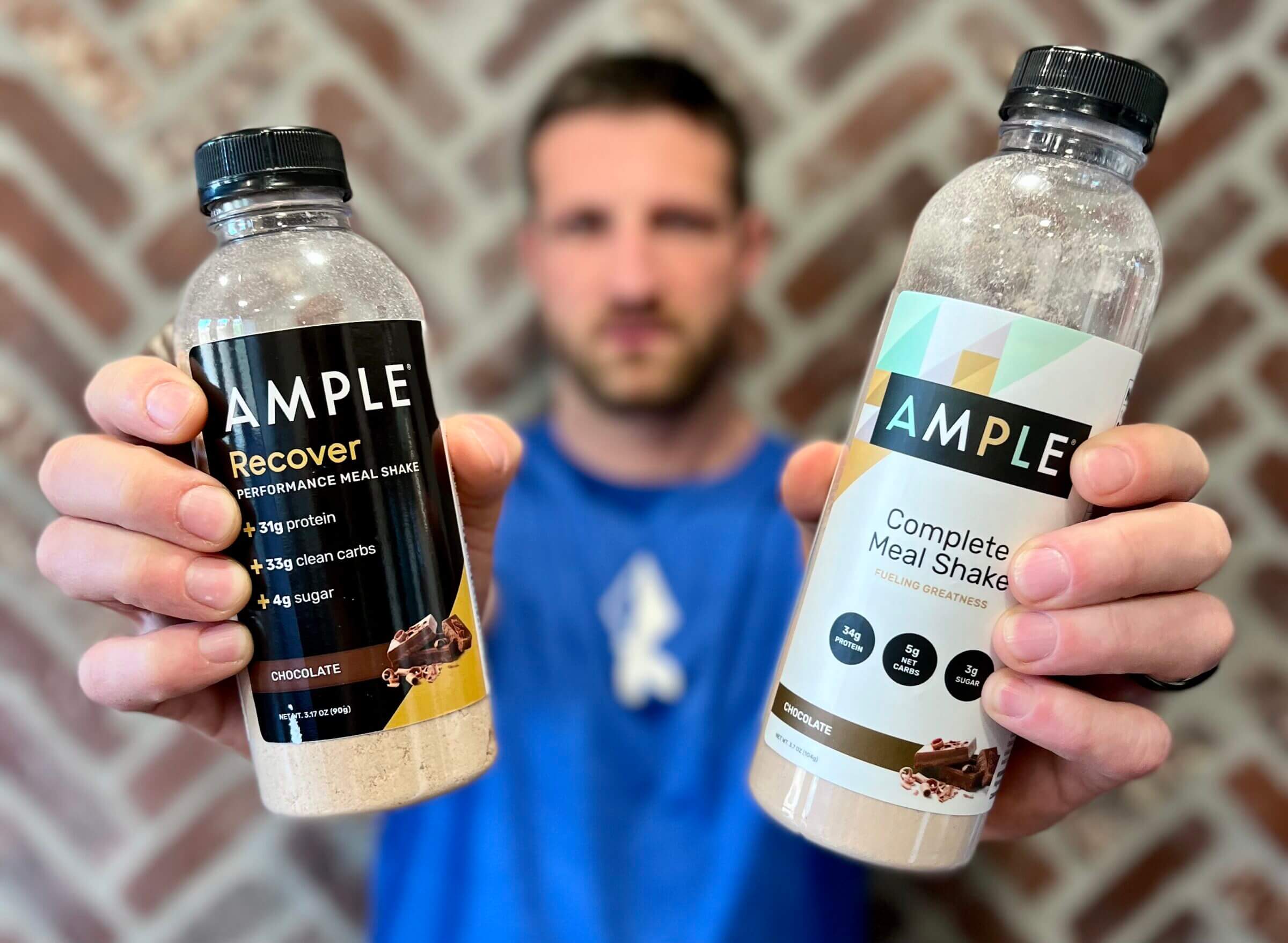
Ample is a complete meal replacement shake that comes in powder form, either pre-bottled or in a bulk canister.
To prepare Ample, all you have to do is add cold water or your favorite milk. Just keep in mind that adding milk changes the macronutrient composition and total calories of the shake.
I typically consume Ample with water because I like how it tastes and I usually don’t have access to raw A2 milk or other liquids when I’m traveling.
Note that Ample is available in different serving sizes and flavors, and their ingredients vary depending on the formula. I’ll make sure to point out the differences between these variations throughout this review.
Before we get into the details, below is a quick overview of the various Ample formulas that are available as of this writing.
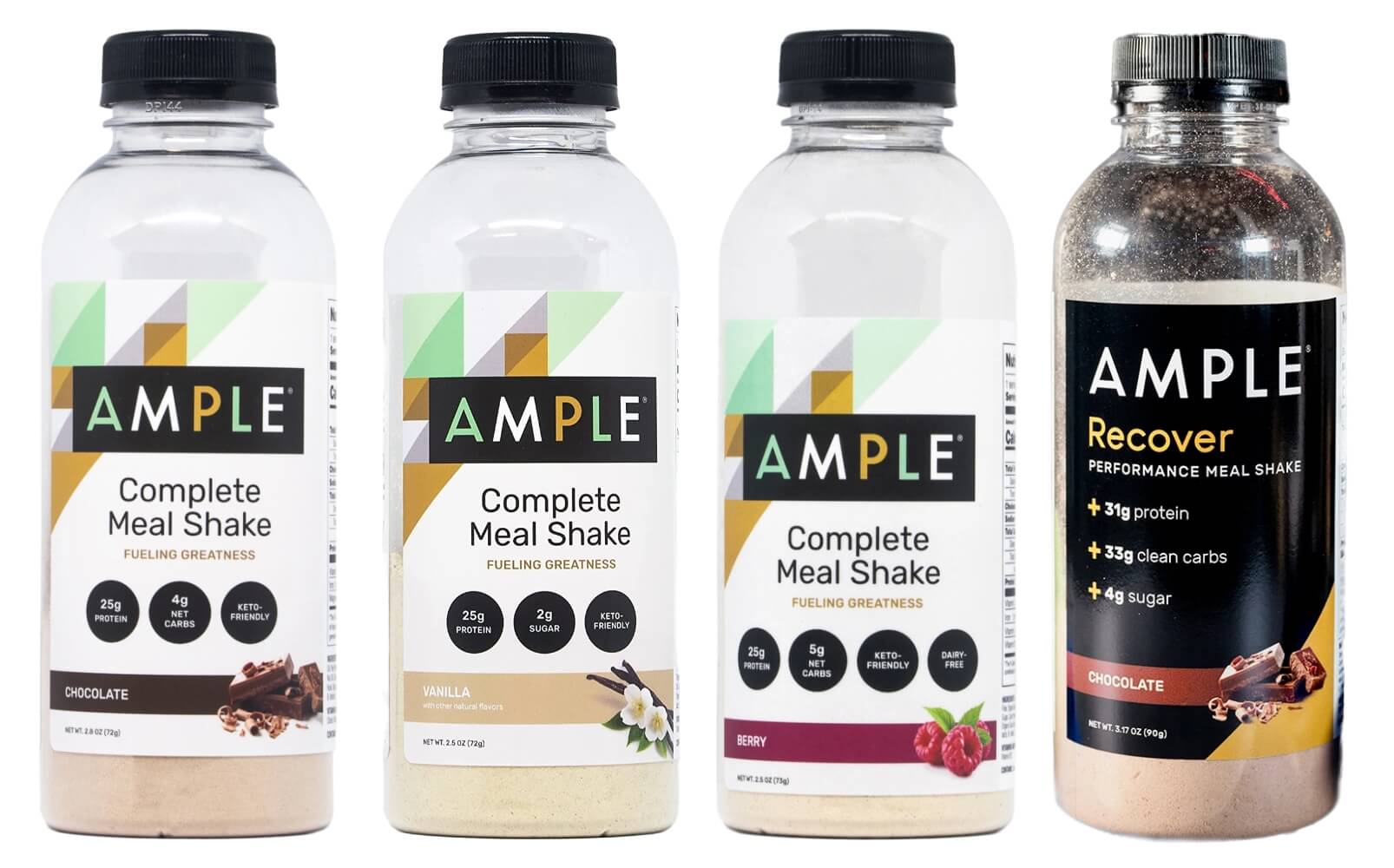
| Ample | Ample Restore | |
|---|---|---|
| Sizes | 400/600-calorie bottle, bulk canister | 400-calorie bottle, bulk canister |
| Flavors | Berry (plant-based), chocolate, and vanilla | Chocolate |
| Low-carb | ✓ | ✘ |
| High-carb | ✘ | ✓ |
| Vegan | Berry flavor only | ✘ |
Ample Benefits
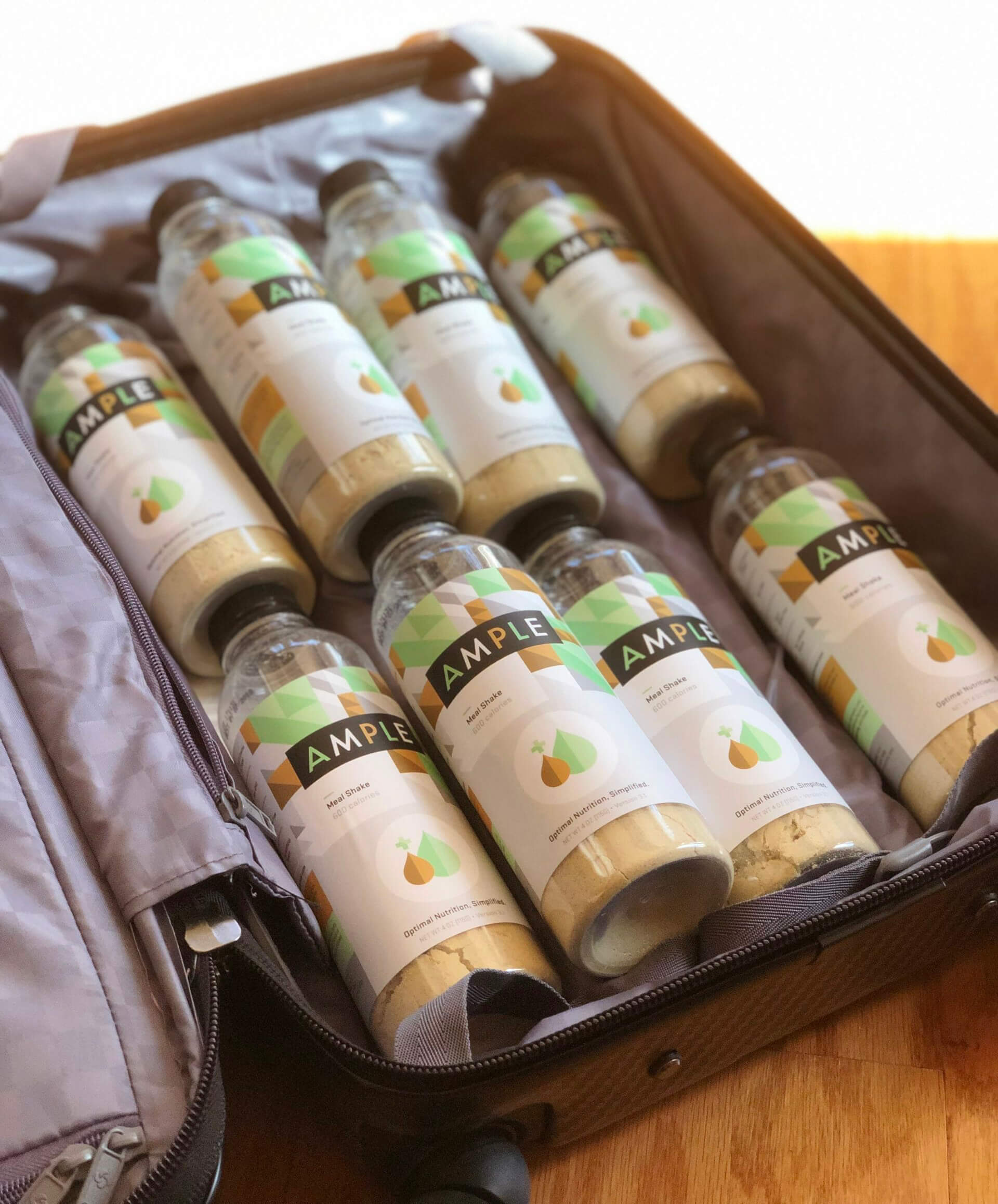
One of the big benefits of Ample is convenience, as it takes less than a minute to prepare. That’s particularly true if you purchase the bottles that are pre-filled with meal replacement powder, since all you have to do to enjoy a delicious meal is to unscrew the cap, add some water, shake the bottle and add more water to top it off.
That’s so much easier than messing around with a separate shaker bottle and measuring out every meal, especially when you’re traveling. Of course, the convenience provided by those plastic bottles raises the question of sustainability; if you care about the environment, I recommend rinsing the bottles and recycling them, or switching to the bulk canister for when you’re home.
The second benefit of Ample is the type and quality of its ingredients. The majority of meal replacement shakes on the market today, including Soylent and SlimFast, are loaded with artificial flavors and/or ingredients that have no place in a healthy diet. Ample contains only carefully-selected ingredients of the highest quality.
That doesn’t mean you should use Ample to replace all of your regular meals. But if you have no other choice, an Ample shake is one of the healthiest real-food alternatives there is.
The third benefit of Ample is that it’s available with different macronutrient compositions. Often, brands that sell meal replacement shakes focus either on low-carb or high-carb diets. Ample has an option for each, and you can even get a low-carb vegan formula (something most brands don’t offer).
Nutrition Facts
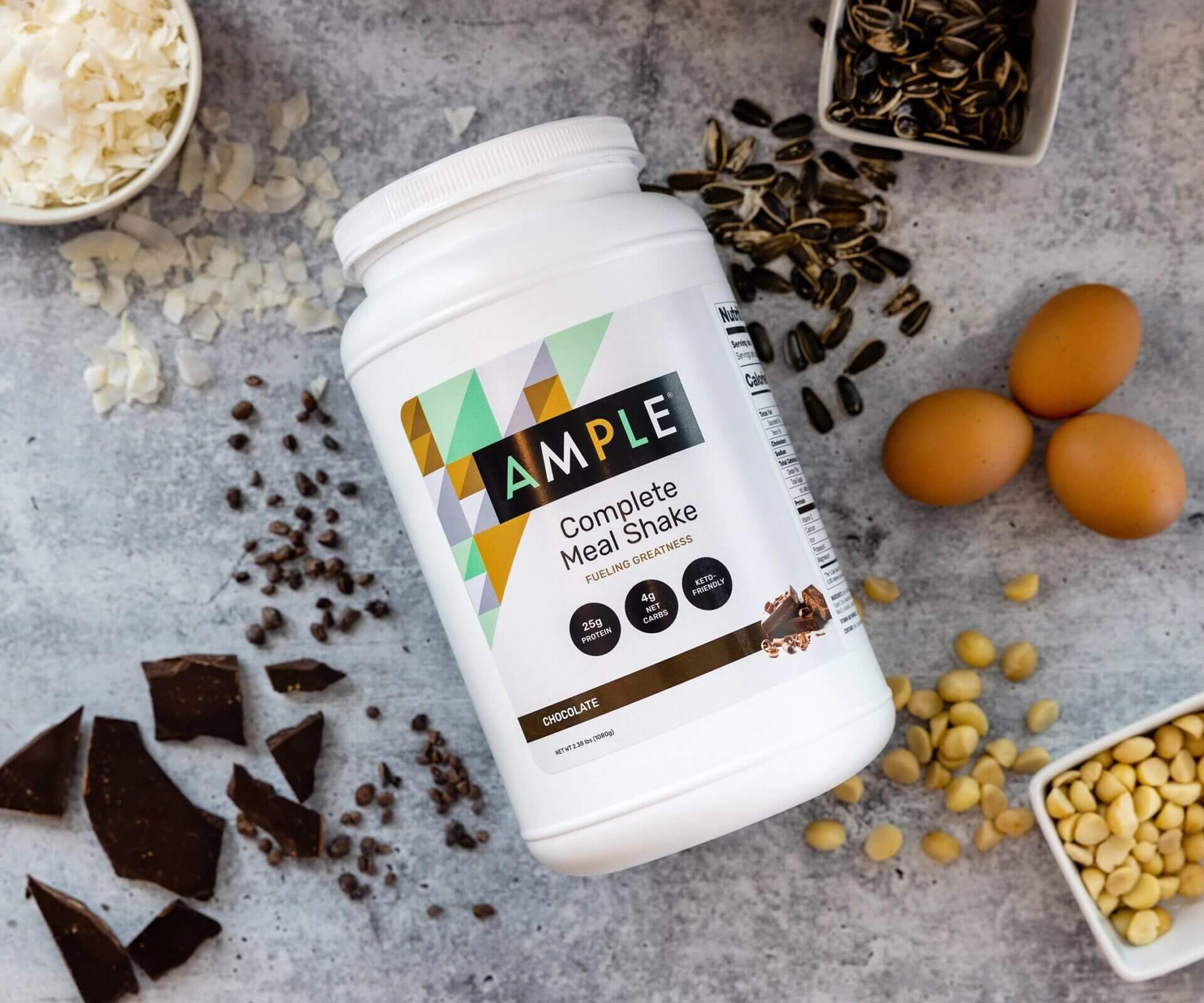
Ample is available in two different formulas, including a low-carb high-fat version that is perfect for anyone who follows a ketogenic diet and a high-carb version called Ample Restore. The latter is great for days when you need a boost in clean carbohydrates, such as before or after an intense workout.
I should also mention that the regular Ample shake is available in three different sizes, including a 400-calorie bottle, a 600-calorie bottle and a bulk canister that contains enough powder for 15 400-calorie meals.
Ample Restore is currently only available in 400-calorie bottles and a bulk canister.
The comparison tables below reflect the nutritional information of the different bottle sizes. Note that the bulk canisters have the same nutrition facts as their respective 400-calorie bottle formulas.
| Ample | Ample (Berry) | Ample Restore | |
|---|---|---|---|
| Calories | 400 | 400 | 400 |
| Protein | 25g | 25g | 31g |
| Fat | 28g | 26g | 15g |
| Carbohydrates (total) | 11g | 14g | 33g |
| Fiber | 7g | 9g | 5g |
| Net carbs | 4g | 5g | 28g |
| Sugars | 2g | 2g | 4g |
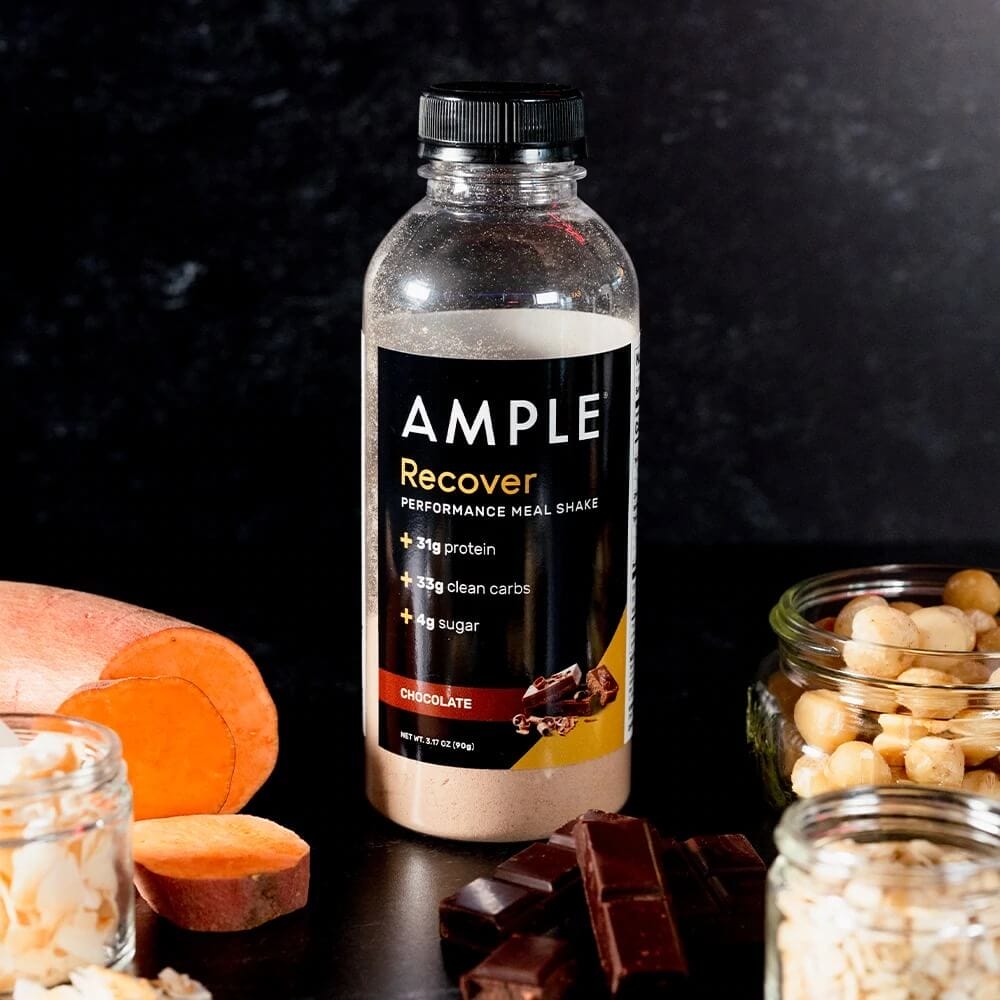
| Ample | Ample (Berry) | |
|---|---|---|
| Calories | 600 | 600 |
| Protein | 34g | 34g |
| Fat | 45g | 42g |
| Carbohydrates (total) | 15g | 20g |
| Fiber | 10g | 13g |
| Net carbs | 5g | 7g |
| Sugars | 2g | 2g |
If you look closely at some of the numbers above, you’ll realize that there are minor differences between the chocolate/vanilla and berry flavors of Ample. That’s because the chocolate and vanilla flavors use the same (animal-based) sources of protein, fats and carbs, whereas the berry flavor relies solely on plant-based sources.
Additionally, not all of the macronutrient values of the 600-calorie bottle are exactly 1.5 times the ones of the 400-calorie bottle, as you might have expected. For example, the 400-calorie bottle of Ample has 28 grams of fat, so you might expect the 600-calorie bottle to have 1.5 times that amount (or 42 grams).
However, that’s not the case because the volume of the 600-calorie bottle is only 25% more than that of the 400-calorie bottle. As a result, Ample had to make some formula adjustments to account for that.
While that’s an irrelevant fact for most consumers, I wanted to point it out for those of you who are counting macros and might have extrapolated from the nutrition label of the smaller bottle.
Total Carbs vs. Net Carbs
The other thing I wanted to briefly talk about is total carbs vs. net carbs.
You might have noticed that the low-carb Ample formula contains a total of 11 grams of carbs but only four grams of net carbs.
Net carbs are the total amount of carbohydrates minus the carbs your body cannot use for energy (i.e., fiber). Anything your body can’t use for energy doesn’t raise blood sugar or insulin levels.
In the case of a 400-calorie bottle of Ample, you’d subtract seven grams of fiber from 11 grams of total carbohydrates to get to the net carb content (four grams).
Micronutrients
Besides carbs, proteins and fat, Ample includes the following micronutrients (depending on the serving/bottle size):
- 10-15% of your daily potassium
- 20-25% of your daily calcium
- 6-8% of your daily iron
- 25% of your daily vitamin D3 (except for the plant-based version)
- 20-25% of your daily magnesium
- 40-50% of your daily vitamin B12 (plant-based version only)
- 4% of your daily vitamin A (plant-based version only)
- 6-8% of your daily vitamin C (plant-based version only)
The first few versions of the original Ample formula did not offer significant amounts of vitamins and minerals, because the company didn’t see the value in simply stuffing the product full of lab-grown vitamins.
I agree with that perspective, because in a nutshell, your body can’t absorb and use most lab-made vitamins, which renders them fairly ineffective.
However, I’m glad to see that Ample decided to add high-quality versions of certain vitamins and minerals to all Ample formulas — specifically, those that many Americans are often deficient in, including calcium and vitamin D3.
Just note that not all of these micronutrients are from whole-food ingredients. In other words, Ample added them to fortify their formulas. Additionally, some of the vitamins in the plant-based Ample formula are vitamin precursors that the body has to convert. An example is beta-carotene (vitamin A), which is poorly absorbed in comparison to the retinol that you would find in animal-based sources of food (such as beef liver).
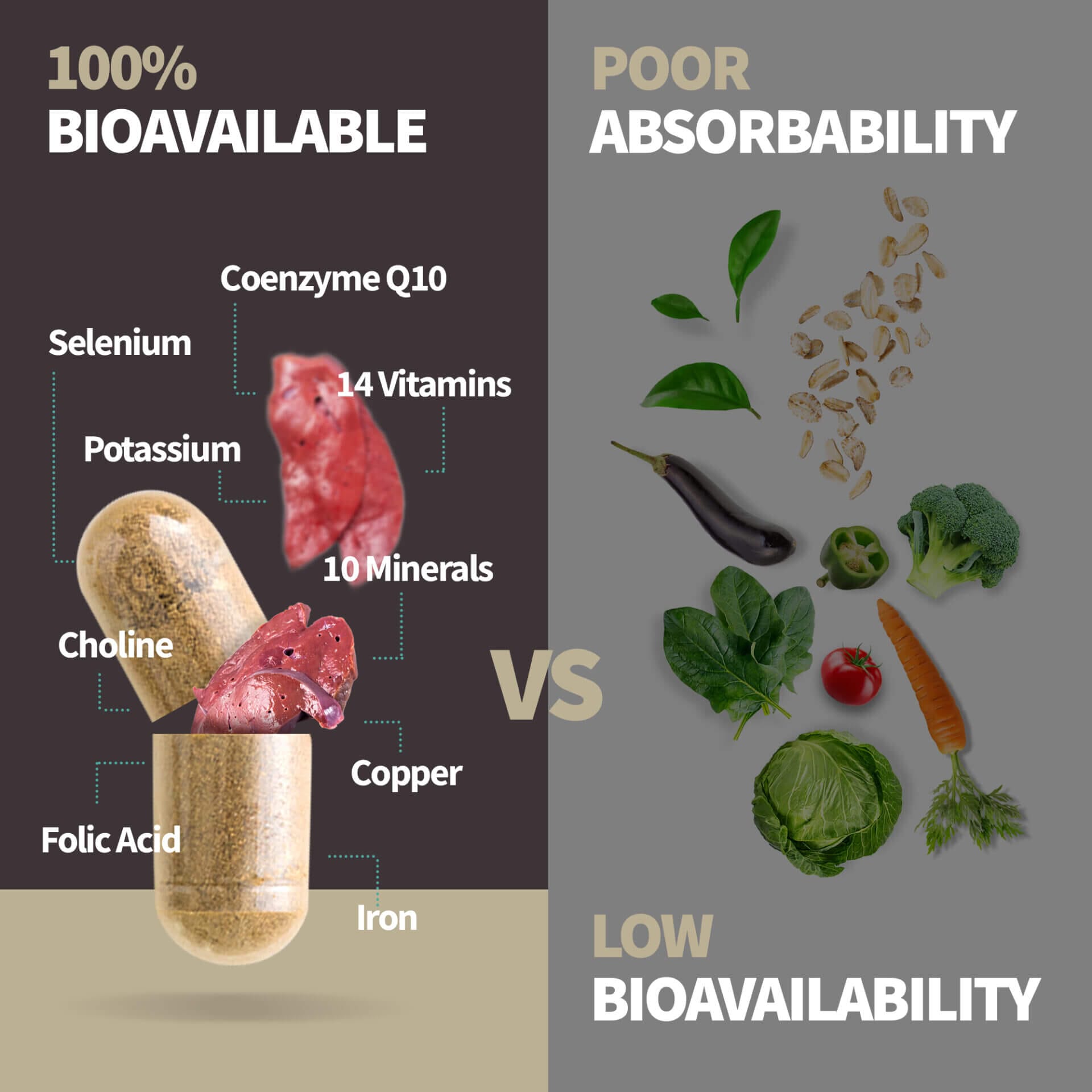
As a result, I don’t recommend relying solely on Ample to fulfill your daily needs of vitamins and minerals. Instead, try to get them from either fresh organ meats or freeze-dried organ meat supplements such as the ones we make at MK Supplements.
Besides the prebiotics in Ample (mostly from psyllium husk fiber) every bottle has 4 billion CFU of probiotics to support your gut health.
Ingredients
Below is an overview of the main ingredients in Ample (chocolate and vanilla), Ample Restore and the low-carb plant-based formula.
Ingredients in Ample (Chocolate)
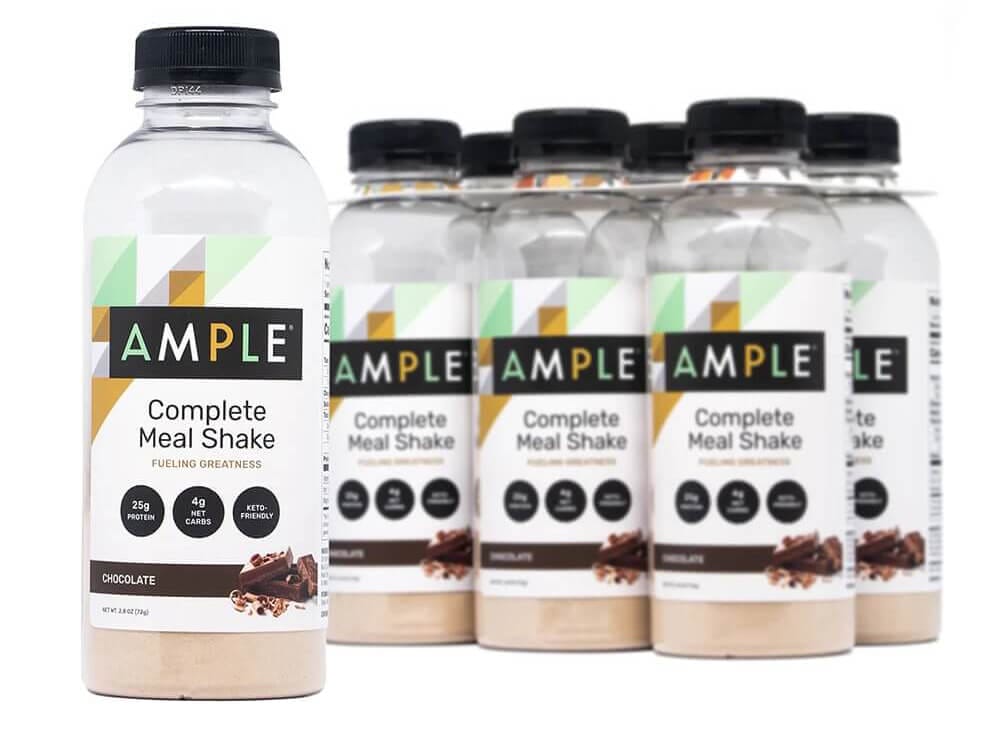
- Fats: coconut oil, high oleic sunflower oil, macadamia nut oil, sunflower lecithin.
- Proteins: grass-fed whey protein concentrate, egg white protein.
- Carbohydrates: soluble tapioca fiber.
- Sweeteners: dried honey, monk fruit extract, stevia extract.
- Fiber: organic psyllium husk, organic guar gum.
- Flavor: organic cocoa, natural flavors, sea salt.
- Vitamins and minerals: calcium citrate, potassium bicarbonate, magnesium citrate, vitamin D3.
- Probiotics: bacillus coagulans, lactobacillus rhamnosus, bifidobacterium infantis, lactobacillus acidophilus, bifidobacterium lactis, lactobacillus paracasei.
Ingredients in Ample (Vanilla)
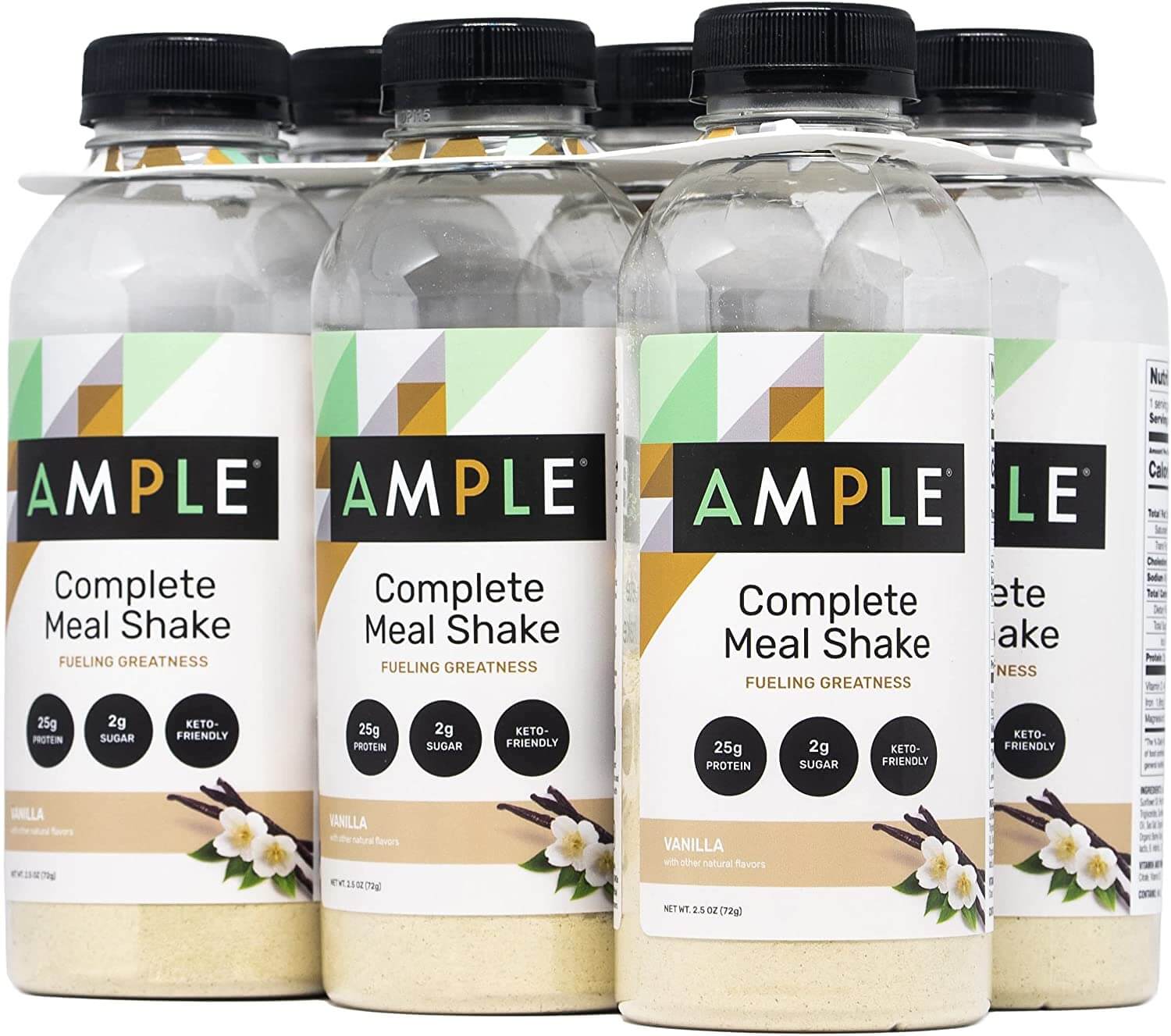
- Fats: coconut oil, high oleic sunflower oil, medium-chain triglycerides, macadamia nut oil, sunflower lecithin.
- Proteins: grass-fed whey protein concentrate, pea protein, egg white protein.
- Carbohydrates: soluble tapioca fiber, organic wheatgrass, organic barley grass.
- Sweeteners: dried honey, monk fruit extract, stevia extract.
- Fiber: organic psyllium husk, organic guar gum.
- Flavor: lemon juice powder, cinnamon, natural flavors, sea salt.
- Vitamins and minerals: calcium citrate, potassium bicarbonate, magnesium citrate, vitamin D3.
- Probiotics: bacillus coagulans, lactobacillus rhamnosus, bifidobacterium infantis, lactobacillus acidophilus, bifidobacterium lactis, lactobacillus paracasei.
As you can see, there are minor differences between the chocolate and vanilla flavors. Specifically, the vanilla flavor contains pea protein (as a thickening agent), MCT oil and a few other ingredients to improve the taste and texture.
Ingredients in Ample (Berry)
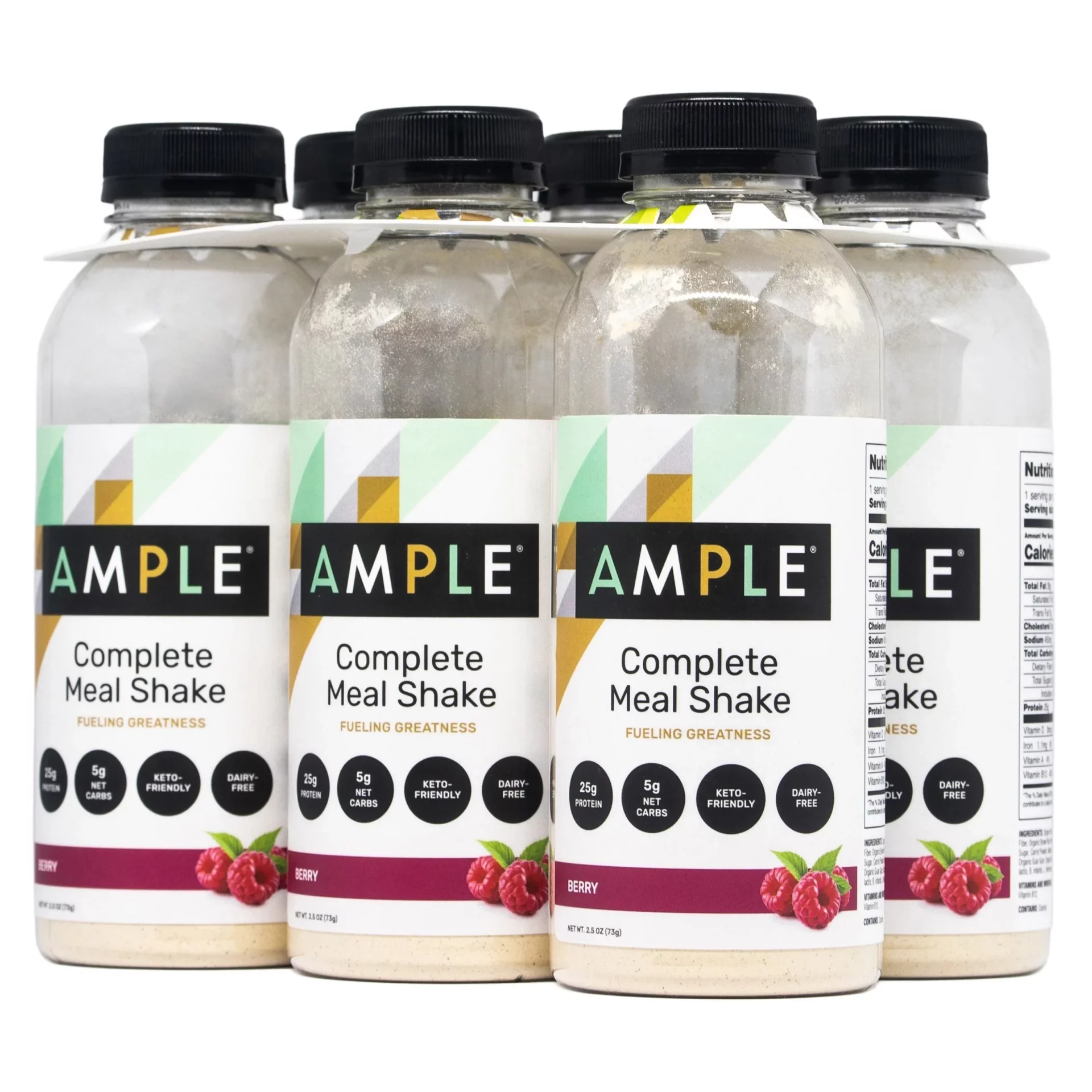
- Fats: coconut oil, high oleic sunflower oil, sunflower lecithin.
- Proteins: organic pea protein, organic brown rice protein.
- Carbohydrates: soluble tapioca fiber, carrot powder, organic wheatgrass, organic kale powder.
- Sweeteners: organic coconut sugar, monk fruit extract, stevia extract.
- Fiber: organic psyllium husk, organic guar gum.
- Flavor: raspberry powder, lemon juice powder, natural flavors, sea salt.
- Vitamins and minerals: calcium citrate, potassium bicarbonate, magnesium citrate, vitamin B12.
- Probiotics: bacillus coagulans, lactobacillus rhamnosus, bifidobacterium infantis, lactobacillus acidophilus, bifidobacterium lactis, lactobacillus paracasei.
Besides the obvious differences between the animal-based and plant-based Ample formulas, it’s also worth noting that the latter is fortified with vitamin B12 instead of vitamin D3.
That’s because vitamin B12 deficiency is a common issue among vegetarian and vegan communities, considering that B12 is predominantly found in animal foods (such as liver meat).
Ingredients in Ample Recover
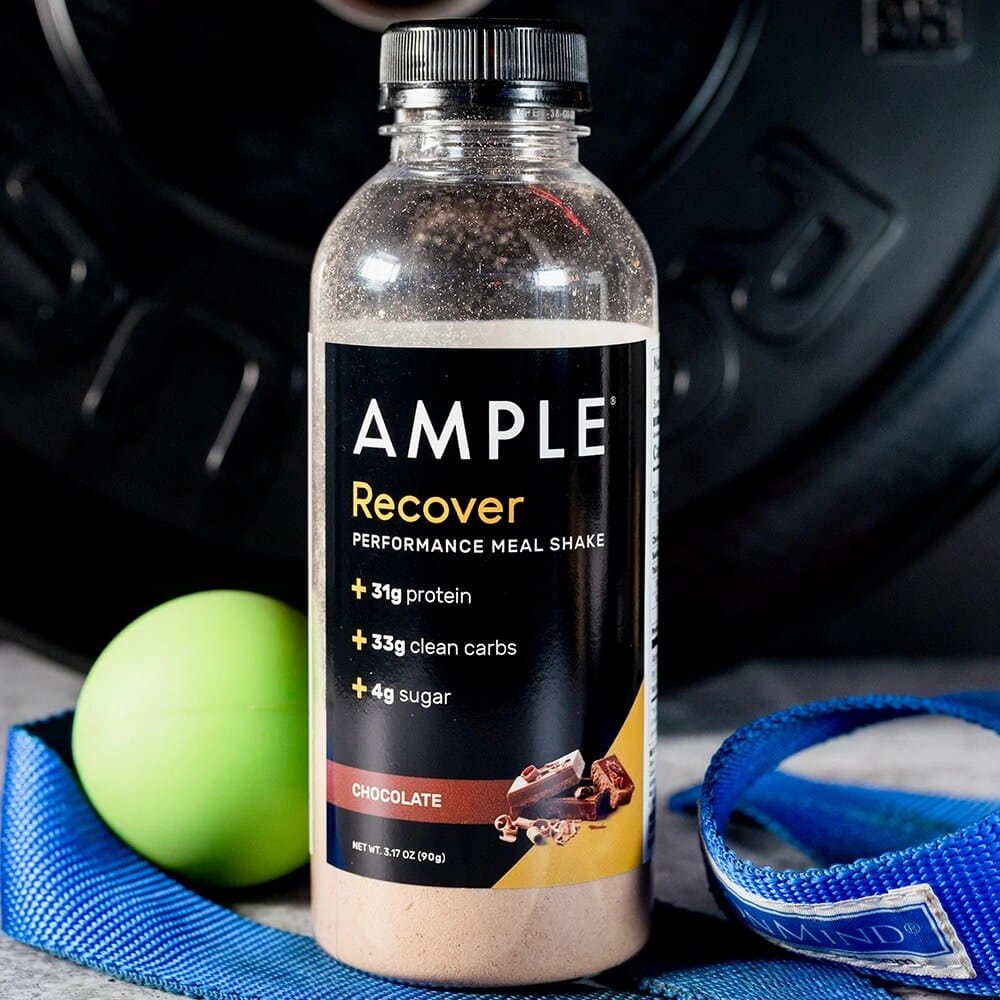
- Fats: macadamia nut oil, coconut oil, high oleic sunflower oil, medium-chain triglycerides, sunflower lecithin.
- Proteins: grass-fed whey protein concentrate.
- Carbohydrates: oats, tapioca dextrin, organic sweet potato powder, soluble tapioca fiber.
- Sweeteners: dried honey, monk fruit extract, stevia extract.
- Fiber: organic psyllium husk, organic guar gum.
- Flavor: organic cocoa powder, natural flavors, sea salt.
- Vitamins and minerals: calcium citrate, potassium bicarbonate, magnesium citrate, vitamin D3.
- Probiotics: bacillus coagulans, lactobacillus rhamnosus, bifidobacterium infantis, lactobacillus acidophilus, bifidobacterium lactis, lactobacillus paracasei.
What’s Not in Ample
Ample has done an incredible job of keeping its meal powder free of unhealthy and highly-processed ingredients. So here’s a list of ingredients you won’t find in the product.
Artificial Sweeteners and Flavors

The words “artificial” and “clean eating” don’t go together. That’s why I try to stay away from products that contain artificial food ingredients. Apart from philosophical reasons, I have recently learned that artificial sweeteners (such as sucralose) can negatively impact how the body reacts to glucose.
I’m not talking about the body’s insulin response, but research has demonstrated that the consumption of artificial sweeteners can lead to the body failing to excrete insulin when it should — for example, when glucose levels rise (leading to blood sugar spikes).
Gluten
Gluten is a protein found in certain grains, such as wheat, that the human body cannot readily break down as part of the digestive process. Some people have celiac disease, which is an immune response to gluten exposure.
What most people don’t know is that suffering from celiac disease is not the only reason why you should stay away from gluten.
You may be sensitive to gluten without suffering an immune response (and without even knowing it). If you’re sensitive to gluten, you may experience any number of symptoms, such as headaches, migraines, stomach problems and more.
The fact of the matter is that humans introduced foods containing gluten only about 10,000 years ago. That’s an incredibly short time for the body to prepare, compared to the 2.6 million years of human evolution that preceded modern agriculture.
Also, keep in mind that the wheat our ancestors ate thousands of years ago has nothing in common with the engineered products we buy today. My advice is that if you’re in doubt about food, apply the evolutionary framework. If it doesn’t fit, don’t eat it.
All Ample formulas are gluten-free.
Soy
Soy belongs to the legume family, and most legumes are toxic when consumed raw. But even when cooked, soy contains numerous antinutrients, such as lectins, that prevent your body from absorbing their nutrients. Those antinutrients can also cause a leaky gut.
Besides that, soy offers fewer nutrients than healthier alternatives. As a result, I recommend staying away from anything containing soy, including tofu and products with soy milk.
All Ample formulas are soy-free.
Non-GMO
Ample uses only ingredients that have not been genetically modified. While I prefer products with the “Non-GMO” label, I realize there aren’t a lot of scientific studies proving that GMO foods are detrimental to your health.
Regardless of how you feel about GMOs, you should know that all Ample formulas are non-GMO.
Taste and Texture

All Ample formulas have a rich and creamy taste and texture, with hints of vanilla and cinnamon, berry or chocolate — depending on the flavor you choose.
The first few evolutions of the Ample Original formula tasted very sweet, which turned some people off. In contrast, the new Ample formulas mix smoother than ever and have a more natural sweetness and creamy flavor.
While I like the taste of all Ample flavors, I’m a sucker for chocolate, and thus like Ample’s chocolate flavor best.
Ample Price and Promo Code
Ample’s price varies depending on the serving size, flavor, number of bottles you order and other factors (including whether you sign up for a subscription). In general Ample costs between $5.27 and $9.00 per serving.
I created the following comparison table to make the Ample meal price more transparent.
| Price | Servings | Per Serving | |
|---|---|---|---|
| Ample (400-calorie) | $90.00 | 12 | $7.50 |
| Ample (600-calorie) | $108.00 | 12 | $9.00 |
| Ample (bulk canister) | $79.00 | 15 | $5.27 |
| Ample Recover (400-calorie) | $96.00 | 12 | $8.00 |
| Ample Recover (bulk canister) | $79.00 | 12 | $6.58 |
Note: As of January 2025, Ample has ben out of production for more than a year. While pre-orders are open, the expected shipping date has changed numerous times. For this reason, we’re not currently including links to the product in this article.
If you plan on using Ample meal replacement shakes on a regular basis, I highly recommend signing up for a subscription. That way, you’ll never run out of product and you’ll get a 15% discount off the prices listed above.
Overall, Ample isn’t the cheapest meal replacement shake on the market. But as is so often the case, you get what you pay for. With Ample, you get only the highest quality ingredients in a convenient package.
Ample takes only a minute and some water (or milk) to prepare — a fact that I appreciate greatly when I don’t have time to prepare a real meal.
To me, price isn’t an issue because I only use Ample when I travel a few times per month. If you need a healthy meal replacement shake more frequently (i.e., daily), I recommend combining the subscription with my discount code for maximum savings.
How to Use Ample Meal Replacement Shakes
Preparing Ample is just a matter of opening the bottle and adding liquid. I usually have Ample with water, but a friend of mine recently told me that she has her Ample with almond milk.
I know that nut milk is considered a healthy alternative to regular dairy, but that’s a misconception. Nuts are incredibly high in pro-inflammatory antinutrients and I’ve mostly much eliminated them from my diet.
Whatever liquid you choose, I recommend filling the bottle about halfway before putting the lid on and shaking it vigorously to dissolve the powder. After that, add more liquid until it reaches the top of the label.
The whole process should take less than a minute.
Most of the time, I use cold water to prepare Ample, but I recently experimented with adding a shot of espresso (or even an Americano).
I tried that because I didn’t have time to drink both Ample and a cup of coffee before leaving for a trip. The mixture tastes surprisingly delicious and could be my favorite breakfast replacement shake.
In case you’re wondering, the shelf life of an unopened bottle of Ample Meal is somewhere between eight and 10 months. But once opened, you want to refrigerate the bottle or drink it within an hour or so.
When to Use Ample Meal
There are dozens of use-cases for Ample, and I keep discovering new ones every few weeks.
Some of the more obvious ones include when:
- I don’t have access to healthy sources of food.
- I’m traveling.
- I don’t have time to prepare a balanced meal.
- Before a workout.
Additionally, I think Ample is a great choice for:
- Office workers, instead of cafeteria food.
- Healthcare professionals or flight attendants.
Frequent Travelers
The primary reason I started using Ample was that I had a hard time finding healthy food choices while traveling for work. I’m on a ketogenic paleo diet, and like many others in the IT industry, I travel a lot.
Over the past few years, I’ve struggled to maintain my clean eating regimen while on the road. Many hotel restaurants and airports, especially in rural areas, just don’t offer reasonably healthy food choices — especially when you remove grains and processed carbs from your list of acceptable foods.
I stumbled across Ample in April 2017 and reached out to their marketing team. They were kind enough to send me a few samples so I could try them and write a review. From that point on, I’ve been hooked.
I know that Ample does not offer a paleo-friendly formula because the company uses whey (dairy) or peas (legumes) as their primary sources of protein, but that’s a sacrifice I’m willing to make.
As a Pre-Workout Meal

While working on my review of meal replacement drinks, I had so many products at home to sample that I had to find creative ways to consume them without upsetting my wife, who loves to cook.
So I started having the 400-calorie version of Ample one or two hours before a workout. I knew that the 600-calorie serving would be too much and could potentially negatively impact my workout performance due to a full stomach. But 400 calories is like a snack for me, and the experiment ended up being a success.
The advantage of a liquid meal like Ample is that your body can absorb it quicker than solid food. Just make sure not to chug it down in one shot; instead, give your stomach a chance to get ready for the liquid calories.
Keep in mind, however, that Ample does not necessarily replace a good pre-workout supplement, which may contain caffeine, creatine and other amino acids your body can use during an intensive workout session.
When I Don’t Have Time to Prepare a Meal

Before I began an intermittent fasting regimen, I used to drink an Ample for breakfast on travel days.
That way, I didn’t have to spend time cooking before heading out the door. I usually get up at 5 a.m., and I’m hardly ever running late in the morning. But I still appreciate having a few extra minutes before hitting the road.
Flight Attendants and Medical Professionals
I often get asked by flight attendants what I’m drinking when I decline the in-flight meal they offer. That made me think that Ample Meal would be a perfect option for flight attendants who may not have the time or the opportunity to enjoy a decent meal (outside of what airlines offer onboard).
Another group that could benefit from Ample is medical professionals, who often work crazy hours and have to rely on crappy cafeteria food. I was thinking about that while waiting for my doctor at my last annual physical. Of course, once he called me in, I forgot to ask him about it.
If you’re a flight attendant or a medical professional, please get in touch with me — I’d love to learn more about your dietary habits while on the clock and find out if and how Ample would be of value.
What I Would Improve in Ample

When I first wrote about Ample I didn’t know much about the challenges of manufacturing a meal replacement drink (or any other supplement for that matter). Since then, I’ve started making my own grass-fed beef organ supplements and I’ve come to appreciate the challenges that come with sourcing ingredients and managing the supply chain.
So while keeping in mind that making a meal replacement powder with dozens of ingredients isn’t easy, I have a few recommendations for how to tweak the product for optimal nutrition, and I’d love to hear Ample’s feedback on these suggestions.
(The items crossed out have been addressed by Ample since I originally published this list.)
Reduce the amount of inulin and thus the potential for gastrointestinal discomfort (gas).Remove chia seeds and thus a source of antinutrients.Add natural sources of potassium for a more favorable sodium/potassium ratio.Add more vitamins and minerals, ideally from natural sources.- Leverage beef protein in favor of milk protein.
- Replace high-oleic sunflower oil with ghee or tallow.
All of Ample’s formulas, except for the plant-based berry flavor, use whey protein concentrate as their main source of protein. While that’s a perfectly fine protein for the majority of customers, those who suffer from severe lactose intolerance might experience GI upset from the trace amounts of milk sugar (lactose) in whey protein concentrate. Using a high-quality beef protein powder would mitigate that issue.
Another ingredient that I’m not a huge fan of is seed oils, because they’re usually high in inflammatory linoleic acid (a polyunsaturated omega-6 fatty acid) and extracted using hexane and other harsh chemicals.
Fortunately, Ample is using a special type of sunflower oil known as high-oleic sunflower oil that’s low in polyunsaturated fats (PUFAs) but high in monounsaturated fatty acids (i.e., oleic acid). As a result, high-oleic sunflower oil is more shelf-stable and doesn’t turn rancid as quickly as regular seed oils. That makes it much less likely to oxidize and cause inflammation in your body.
Much like seed oils, nut oils are another potential cause of concern due to their high concentration of omega-6. Fortunately, macadamia nuts are also very low in PUFAs but high in monounsaturated fatty acids. That makes them one of the healthiest nuts (besides coconuts) as far as their fatty acid composition is concerned.
However, I’m a firm believer that the healthiest fats you can eat are the ones humans have consumed for millions of years — and long before the invention of machinery that can extract oils from nuts and seeds. I’m referring to the fat of ruminants and, in particular, to grass-fed beef tallow.
So ignoring all potential issues associated with sourcing, formulating and bottling a meal replacement shake that has tallow as its primary source of fat, I’d love to see Ample use tallow instead of nut and seed oils.
A Note About Ample’s Plastic Bottles
The last issue with Ample I want to point out is related to the use of plastic for the bottles and the bulk canister.
All plastics can leach endocrine-disrupting chemicals (known as xenoestrogens) into foods. This is particularly true when the foods in question are in liquid form. While I have not seen any scientific evidence that chemicals can transfer from plastic containers into powders at normal temperatures, I try to avoid plastic food containers whenever possible.
Of course, sometimes that’s not possible (or is not possible without significant inconvenience). In the case of Ample, I believe being able to enjoy a healthy meal when the alternative would be junk food outweighs the downsides of the plastic bottles.
That said, once you add water to a bottle of Ample, I recommend consuming it immediately, refrigerating the bottle or transferring the liquids into a glass or stainless steel container (if you don’t consume it immediately). If you use the bulk canister, I recommend using a glass or stainless steel shaker bottle (or a frother) to mix the powder with the liquid.
Unfortunately, there is no practical solution for Ample to replace the plastic in its containers. For example, switching to glass would dramatically increase the weight of the product and shipping costs, rendering Ample way too expensive for most consumers.
When I mix a bottle of Ample, I just drink it immediately or transfer the liquids into a glass. Doing so mitigates the problem without reducing the convenience of the bottles.
Frequently Asked Questions

If you had asked me that question a year ago, I would have recommended Ample over Ample Restore in a heartbeat because I avoided carbs as much as possible.
These days, I strategically use both carbs and fat as sources of fuel. In other words, I consume more carbs on days that I empty my glycogen stores during intense workouts. On the flip side, I stick with higher amounts of fat when I don’t work out.
The same applies to my use of Ample meal replacement shakes. On days that I travel I usually don’t work out and thus I bring the low-carb Ample formula. But if I work out and then hit the road immediately, I might grab Ample Restore to help my body replenish my empty glycogen stores.
If you’re lactose intolerant and can’t handle Ample or Ample Restore, Ample’s Berry flavor is a reasonable choice. Beyond that, I wouldn’t recommend the plant-based formula because I don’t think plants are the best source of nutrients for humans.
In my opinion, Ample is one of the healthiest meal replacement products on the market. To learn more about how Ample compares to other products, check out this keto meal shakes comparison article.
Yes, I think oats are a better and slower-digesting form of carbohydrates than tapioca dextrin or tapioca fiber. As such, I appreciate that Ample Restore uses oats as its primary source of carbohydrates.
Bisphenol A (BPA) is a chemical compound that plastic manufacturers have used since the 1960s. Research has shown that BPA can leak into foods and beverages and have a negative impact on your health.
Pure protein powders provide protein but not fat or carbohydrates. As a result, a protein shake has fewer calories and cannot replace a full meal.
Most Ample formulas contain whey protein, which can have residual amounts of lactose. Depending on how sensitive you are to lactose (milk sugar), Ample might not be for you.
Unlike some other meal replacement shakes, including Bear (which was recently discontinued), Ample doesn’t contain any sugar alcohols (such as erythritol).
Soylent is a low-quality, vegan meal shake that is unhealthy and filled with cheap ingredients, and I wouldn’t recommend it. Read my Soylent review for more on why I think it’s an objectively bad product.
As far as I’m concerned, there is no such thing as a shake that makes you magically lose weight. Weight loss is a byproduct of a healthy lifestyle centered around foods that humans have consumed over millions of years, regular exercise, quality sleep and stress management.
However, Ample meal shakes can certainly be a part of that puzzle — especially if they help you avoid consuming processed junk food.
I consider saturated fats from ruminant animals to be the healthiest fats for humans and I generally recommend avoiding industrial seed oils. While I don’t consider some of the fats in Ample to be the best choices for humans, they are low in polyunsaturated fatty acids, and thus can be considered healthy fat.
Learn more about the different types of fat and why the consumption of saturated fats doesn’t raise cholesterol.
Yes, all Ample formulas have prebiotic fibers in the form of organic psyllium husk.
Yes, Ample can help you develop a healthier gut microbiome because it contains both prebiotic fibers (food for good bacteria) and probiotic bacteria.
However, it’s important to understand that to heal your gut you must also remove any foods from your diet that might have contributed to your gut dysbiosis. I’m referring specifically to highly-processed junk food, industrial seed oils and plants that are rich in anti-nutrients.
The other factor that can negatively influence your gut health is stress. Make sure you manage stress appropriately, and don’t be afraid to leverage stress relief gadgets (they work, and I use them).
All Ample formulas contain essential amino acids. Specifically, the chocolate and vanilla flavors of Ample as well as Ample Restore are excellent sources of amino acids because they contain grass-fed whey protein concentrate, one of the most bioavailable sources of amino acids.
No, Ample doesn’t have pre-formed collagen. However, most Ample formulas (with the exception of the berry flavor) have whey protein that contains the amino acids the body requires to make collagen.
All Ample formulas, except for the plant-based Berry flavor, contain grass-fed whey protein concentrate as their primary source of protein and amino acids.
Ample used to use acacia fiber as a source of carbohydrates that the body can’t use for energy. However, with the latest formula updates, Ample now uses psyllium husk fiber instead.
Ample Meal Replacement Review: Final Thoughts
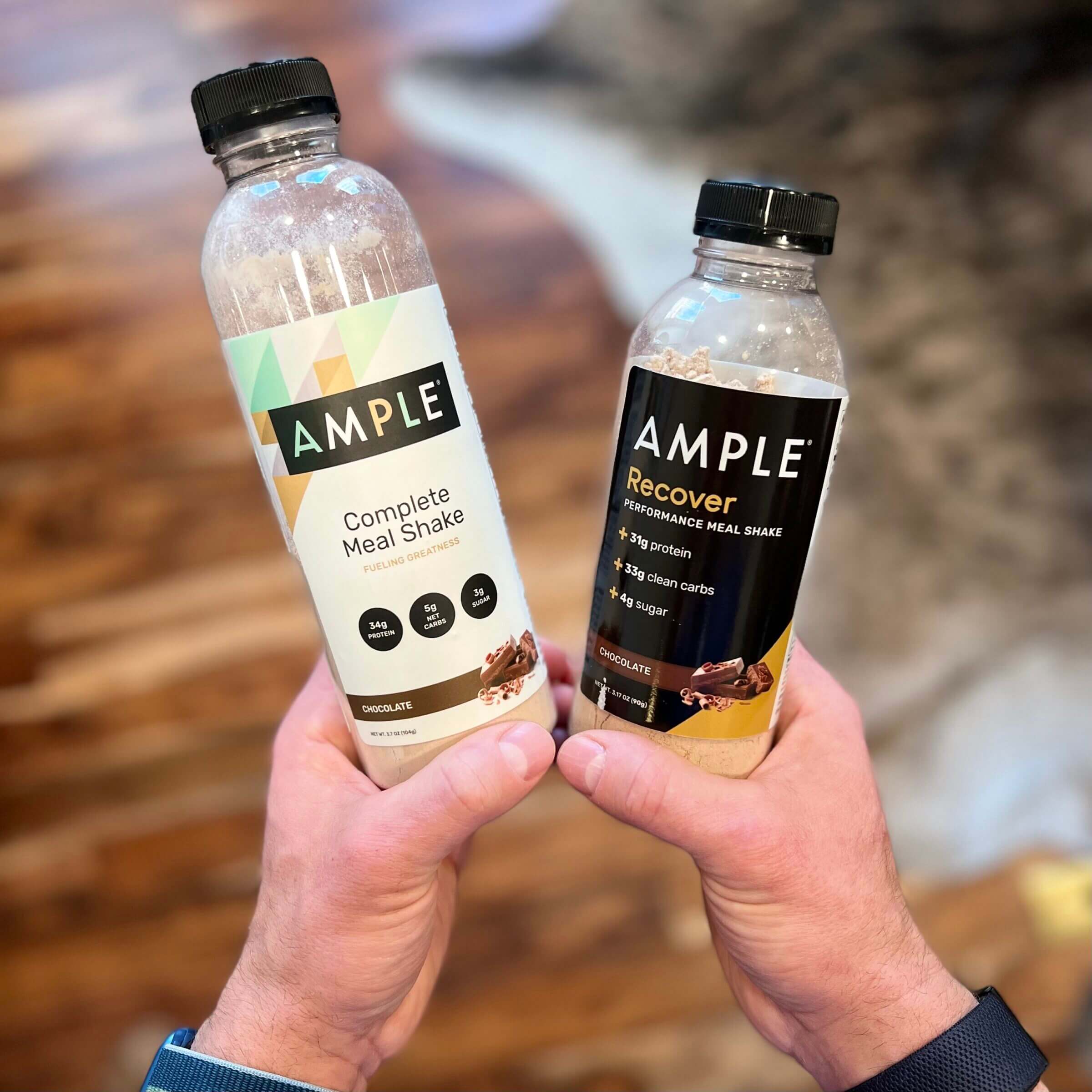
Ideally, every meal would be freshly-prepared and feature a paleo-compatible mix of animal products, fruits and the least-toxic vegetables. Unfortunately, we all know it’s not always possible to find such dishes.
It’s easy to stick to your meal plan when you’re at home, but just as easy to make exceptions when you’re on the road. After all, what’s a few extra grams of sugar here and there, right?
The reality is that a few extra grams of sugar isn’t going to kill you. But once you start leading a healthy lifestyle that makes almost exclusive use of nutrient-dense foods, you won’t want to go back.
If you’re anything like me, you can tell the difference in how your body feels when you make those dietary exceptions — and you want to avoid that feeling. It doesn’t take many weeks of healthy eating to realize just how bad for you highly-processed foods are.
That’s why I use Ample, and why it’s my favorite choice for a meal replacement drink. The bottles offer convenience while traveling, and are an excellent alternative when I can’t find solid food that meets my dietary requirements.
Ample allows me to stay on track in almost any circumstances and helps me avoid making dietary decisions I would later regret.
If you’re aiming to live a healthier life and have never tried Ample’s meal replacement drink, I encourage you to give it a shot.

Michael Kummer is a healthy living enthusiast and CrossFit athlete whose goal is to help people achieve optimal health by bridging the gap between ancestral living and the demands of modern society.
Medical Disclaimer
The information shared on this blog is for educational purposes only, is not a substitute for the advice of medical doctors or registered dieticians (which we are not) and should not be used to prevent, diagnose, or treat any condition. Consult with a physician before starting a fitness regimen, adding supplements to your diet, or making other changes that may affect your medications, treatment plan or overall health. MichaelKummer.com and its owner MK Media Group, LLC are not liable for how you use and implement the information shared here, which is based on the opinions of the authors formed after engaging in personal use and research. We recommend products, services, or programs and are sometimes compensated for doing so as affiliates. Please read our Terms and Conditions for further information, including our privacy policy.


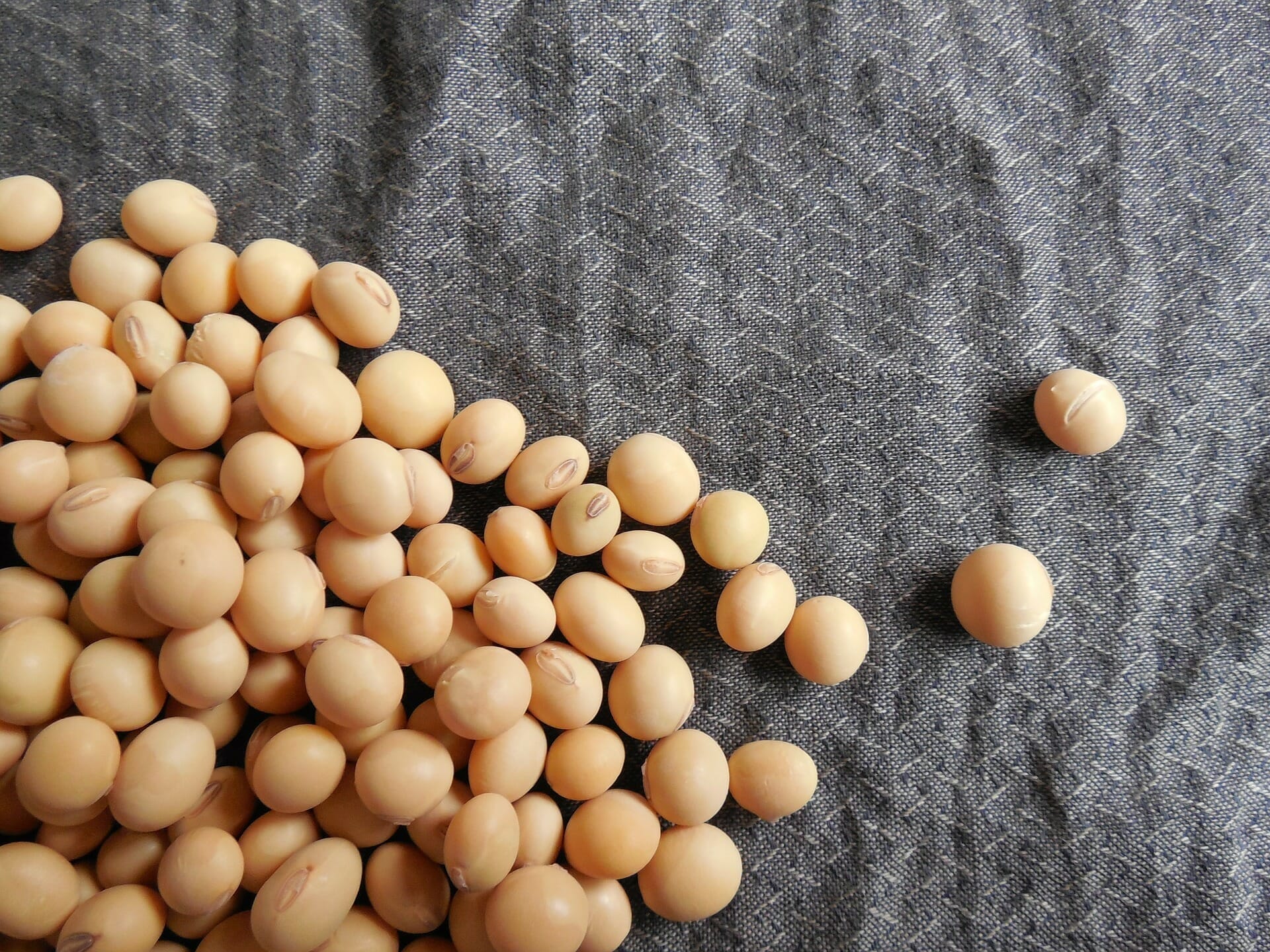
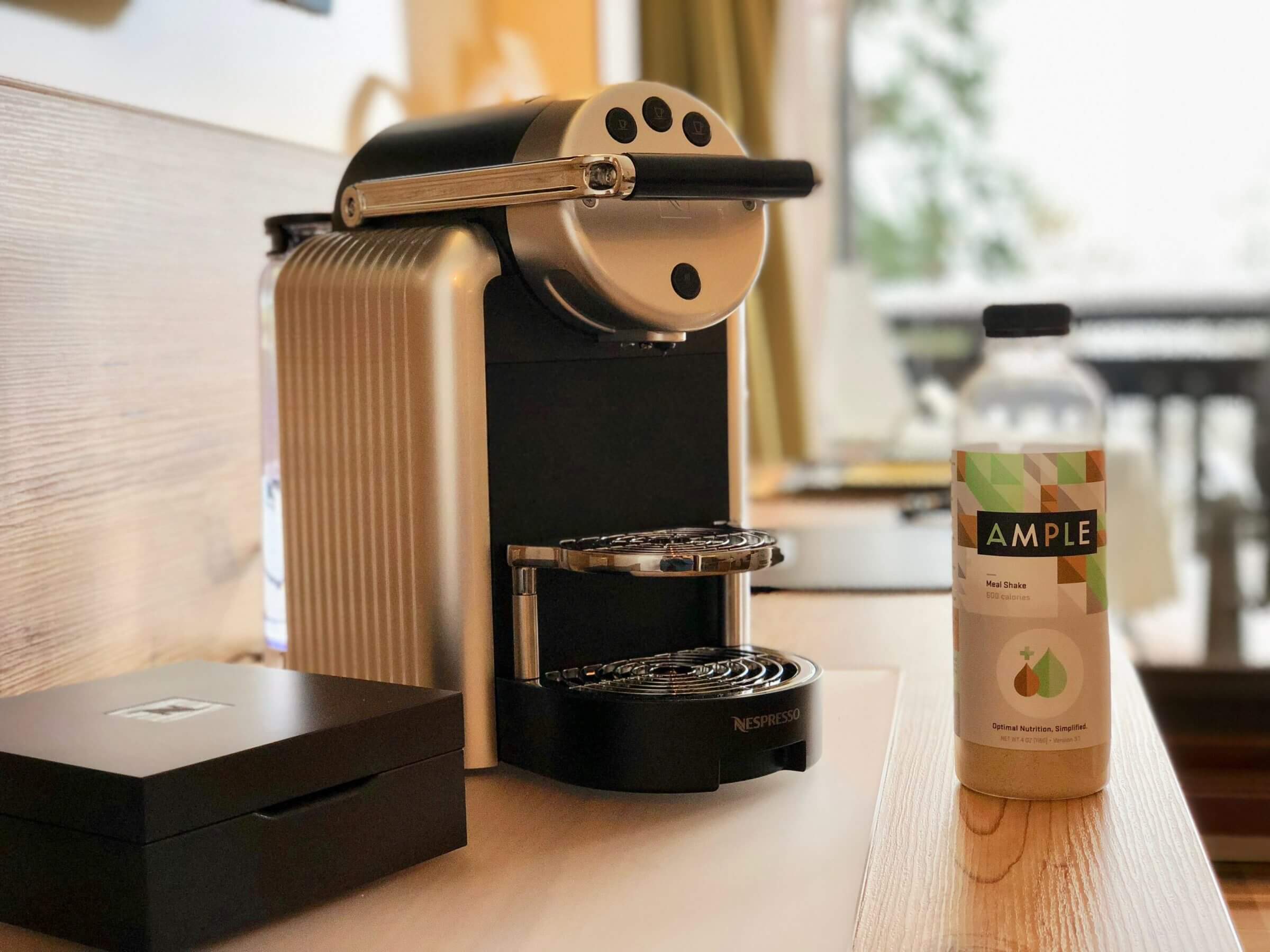
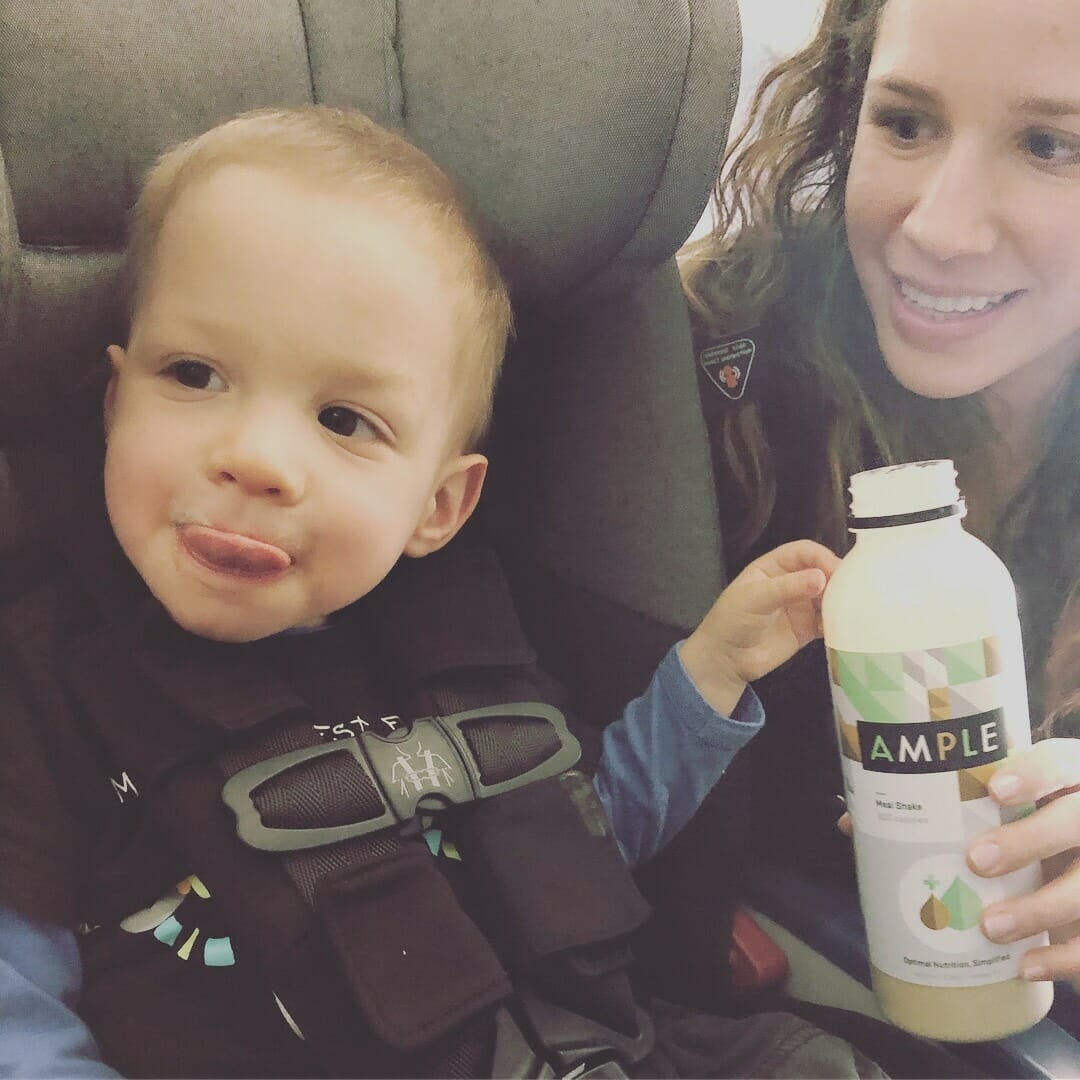

Hi, do you know if Ample contains all nine essential amino acids to form complete proteins?
Thank you!
Danielle
Hey Danielle,
Yes, Ample uses Whey and egg protein which have all the essential amino acids.
Cheers,
Michael
I wonder, between this one and HLTH code
What will you prefer and why?
Both seem to be very good, both keto friendly too and both are 400 calories
Hi Oz,
I really like both. Ample is super convenient for traveling because the powder is already in bottles and because it offers a high-carb formula that some athletes may prefer. HLTH Code is great because of its 1:1 protein to fat ratio and because it comes in pouches that aren’t plastic.
So it depends on what your priorities are!
Cheers,
Michael